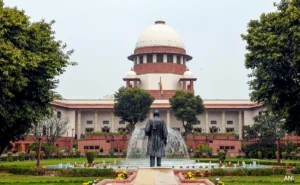GS2 – Judiciary

Context
On August 27, 2025, Justices Alok Aradhe and Vipul M. Pancholi were sworn in as judges of the Supreme Court of India by Chief Justice Gavai, restoring the court to its full sanctioned strength of 34 judges. This strength will continue until CJI Gavai’s retirement on November 23, 2025.
- Constitutional Basis
- Article 124(2): Empowers the President to appoint judges to the Supreme Court “after consultation with such of the Judges of the Supreme Court and of the High Courts in the States as the President may deem necessary.”
- Evolution of the Collegium System
- First Judges Case (1982): The Supreme Court held that the President is not bound by the advice of the Chief Justice of India (CJI) and can consult other judges.
- Second Judges Case (1993): The Court ruled that the CJI’s opinion, formed after consultation with a collegium of senior judges, is binding. This established the primacy of the judiciary in judicial appointments.
- Third Judges Case (1998): The Court clarified that the collegium should consist of the CJI and four senior-most judges, emphasizing the need for a transparent and consultative process.
- Memorandum of Procedure (MoP)
The MoP, formulated in 1998, outlines the process for judicial appointments:
- Initiation: The CJI, in consultation with the collegium, initiates proposals for appointments.
- Consultation: The collegium consults with other judges, the Bar, and relevant stakeholders.
- Recommendation: The collegium recommends names to the President through the Union Minister of Law, Justice and Company Affairs.
- Presidential Approval: The President, upon receiving the recommendation, formally appoints the judge.
- Appointment of Chief Justice of India (CJI)
- Convention: The seniormost judge of the Supreme Court is appointed as the CJI.
- Procedure: The outgoing CJI recommends the next CJI to the Union Minister of Law, Justice and Company Affairs, who forwards it to the President for approval.
- Ad Hoc and Acting Judges
- Ad Hoc Judges: Under Article 127, if there is a shortage of quorum, the CJI can request a High Court judge to sit as an ad hoc judge in the Supreme Court.
- Acting CJI: Under Article 126, if the office of the CJI is vacant, the President appoints the seniormost judge as the Acting CJI.




